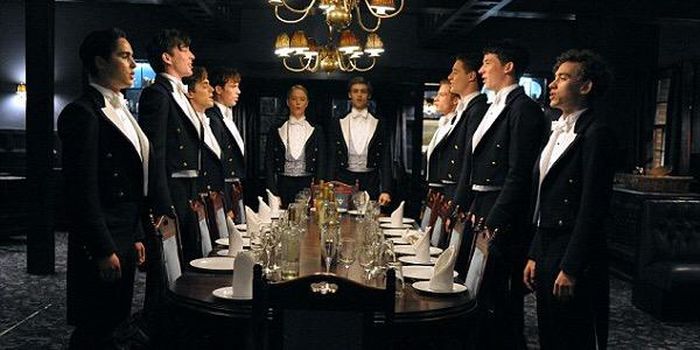I’m Thinking of Ending Things review – Kaufman’s latest is as surreal as it is bewildering
Netflix’s latest foray into arthouse cinema explores the mind-altering substance of fiction — and we’re hooked, writes Maria Kaminska.
After the success of Roma (2018), Netflix continues its expansion into arthouse, this time investing in the niche film project of Charlie Kaufman – chief Hollywood mind-explorer. Released at the beginning of September, I’m Thinking of Ending Things is not what you would have expected from the streaming mogul. Instead of light entertainment, we receive a paranoid tale about those dark places in our heads that we desperately attempt to silence with the help of fiction. ‘It’s like the rabies virus, attaching itself to our ganglia, changing us into itself’ – the main protagonist (Jesse Buckley), enigmatically described as ‘a young woman’ in the closing credits, says that line about the influence of the cinema and the stories it sells on our lives. Indeed, in Charlie Kauffman’s latest feature, fictional worlds blend with reality, challenging the very possibility of understanding oneself without the filter of fiction.
The beginnings are innocent: a seemingly happy couple (the aforementioned Jessie Buckley and Jesse Plemons who plays Jake) sets off on a journey to meet his parents. The road is long, the snow is falling, the cracks in their relationship become apparent, at least from her perspective. After all, she’s the one who’s thinking of ending things.
Soon after their arrival at Jake’s parents’ farm, the plot thickens. The deceptively linear narration falls apart during the family dinner – reality starts to disintegrate, names get mixed up (Is Buckley’s character name Lucy? Lucia? Ames?), facts blur together (Did they meet during the Pub Quiz, or when she was serving his table as a waitress?), even Jake’s parents (played by the wonderfully bizarre Toni Collette and David Thewlis) seem to travel in time, sometimes appearing as younger or older versions of themselves. Brace yourself – things only get weirder, with scenes like the janitor dancing to Oklahoma, the pastiche of Nobel’s speech from Beautiful Mind, and an animated pig being eaten alive by maggots.
Just like Kaufman’s earlier films, I’m Thinking of Ending Things is a deep-dive into the quirks of our mind. Similar to Being John Malkovich (1999) or Synecdoche, New York (2008), it’s getting inside the heads of outsiders and outcasts, only to show how we’ve all been leading lives mediated by works of fiction. If we assume that the whole ‘a couple visiting parents’ storyline happens in the janitor’s mind, it is Jake’s childhood bedroom which serves as arc, unifying all of the disintegrated cultural references.
“Experiences mediated by fiction grow in our consciousness like gangrene, after a while it’s hard to distinguish a healthy tissue from the dead.”
From the irritating jingles (like Tulsey Town’s catchy ad), to books we read, and films we watch – it all mediates our perception of the world and ourselves. ‘Most people are other people, their thoughts are someone else’s opinions, their lives a mimicry, their passions a quotation’, Buckley’s character says, quoting Wilde. Fictional worlds are embedded in our mind so deeply that it’s impossible to tell what’s really underneath. I’m Thinking of Ending Things seems to be especially interested in this Leviathan-like quality of the storytelling – experiences mediated by fiction grow in our consciousness like gangrene, after a while it’s hard to distinguish a healthy tissue from the dead. Eventually, cinema itself becomes a machine for re-living someone else’s lives.
Being itself woven from quotations, the film is explicitly self-referential and obsessed with storytelling. It is the impossibility of creating an entirely original story, or even more than that, the inability to know oneself without the filter of fiction that we’d grown up with, and which has grown into us, that constitutes its narrative arc. I’m Thinking of Ending Things could have originated only in the mind of someone who is haunted by fictional worlds – how lucky we are that Kaufman’s invited us in.
 News / CUP announces funding scheme for under-represented academics19 December 2025
News / CUP announces funding scheme for under-represented academics19 December 2025 News / Cambridge welcomes UK rejoining the Erasmus scheme20 December 2025
News / Cambridge welcomes UK rejoining the Erasmus scheme20 December 2025 News / SU reluctantly registers controversial women’s soc18 December 2025
News / SU reluctantly registers controversial women’s soc18 December 2025 Film & TV / Timothée Chalamet and the era-fication of film marketing21 December 2025
Film & TV / Timothée Chalamet and the era-fication of film marketing21 December 2025 Comment / Yes, I’m brown – but I have more important things to say22 December 2025
Comment / Yes, I’m brown – but I have more important things to say22 December 2025









